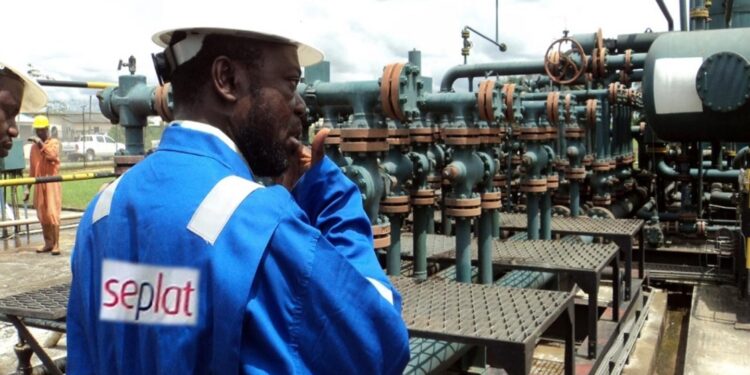Seplat Energy Plc has announced the release of its prospectus for the acquisition of Mobil Producing Nigeria Unlimited (MPNU).
This development follows the federal government’s approval in late October 2024 for the sale of ExxonMobil’s onshore assets to Seplat Energy, over two years after the deal was agreed.
In a statement released on December 9, 2024, and signed by its Chief Executive Officer, Roger Brown, Seplat confirmed that the acquisition will be finalized on December 12, 2024.
The transaction is set to more than double Seplat’s production capacity, boosting output to approximately 120,000 barrels of oil equivalent per day.
Describing the acquisition as a “transformative” milestone, the statement highlighted Seplat Energy’s potential for accelerated growth and increased profitability.
“This transaction, which is expected to be completed on December 12, 2024, is transformative for Seplat Energy, more than doubling production to around 120,000 barrels of oil equivalent per day. It provides the company with a significant opportunity to drive growth and profitability while making meaningful contributions to the Nigerian economy,” the statement read.
The assets being acquired are regarded as high-quality additions to Seplat’s portfolio.
What to know
Seplat Energy’s $800 million MPNU acquisition comprises:
- $672 million payable at closing.
- A $128 million deposit already paid in 2022.
- And a deferred payment of $257.5 million due by December 2025 to cover decommissioning and joint venture (JV) costs, with no new equity issuance required.
The transaction raises pro forma 2P reserves by 86% to 887 MMboe, boosts production by 148% to 119,800 boepd, increases revenue by 245% to $1.456 billion, and grows adjusted EBITDA by 199% to $800 million.
- The expanded portfolio adds equity in 11 blocks, 48 producing fields, 5 gas processing facilities, and 3 export terminals, with significant opportunities for short-term oil gains, in-fill drilling, and multi-Tcf gas projects.
Seplat to gain key assets with MPNU acquisition
Seplat Energy’s acquisition of Mobil Producing Nigeria Unlimited (MPNU) brings significant assets, including a 40% operated interest in OMLs 67, 68, 70, and 104, as well as stakes in the Qua Iboe export terminal, Yoho FSO, and Bonny River Terminal.
Additionally, the deal transitions approximately 1,000 staff and 500 contractors to Seplat’s workforce.
MPNU’s oil and gas reserves, at 409 MMboe, will significantly boost Seplat Energy’s 2P reserves to 887 MMboe.
In addition, production is projected to rise 148%, boosted by MPNU’s 67 contributions.
Funding completion
Seplat Energy’s acquisition of MPNU, announced on February 25, 2022, and effective from January 1, 2021, was originally valued at $1.283 billion, including up to $300 million in contingent payments spread over five years, along with standard adjustments.
- The final consideration, after adjustments, is $800 million, with $128 million already paid as a deposit.
- Funding for the remaining $672 million will come from credit facilities and cash, with an additional $257.5 million deferred until December 2025 for decommissioning and JV costs.
- The transaction is set to be completed on 12 December 2024, with Seplat’s shares expected to be readmitted to the UK Financial Conduct Authority’s Official List the following day.
Backstory
On February 25, 2022, Seplat Energy Plc announced its $1.28 billion acquisition of Mobil Producing Nigeria Unlimited (MPNU) from ExxonMobil Corporation, aiming to take over its offshore shallow water operations.
- However, the Nigerian National Petroleum Corporation (NNPC) exercised its Right of First Refusal (RFR) under the Joint Operating Agreement (JOA), challenging the deal.
- In May 2022, the federal government declined to approve the transaction, citing overriding national interest.
- On July 6, 2022, an Abuja court issued an interim injunction preventing ExxonMobil from divesting its subsidiary holding four licenses in Nigeria.
By July 2024, the legal barriers were lifted as NNPC withdrew its lawsuit and approved the sale in line with the Petroleum Industry Act (PIA), paving the way for the transaction to move forward.















